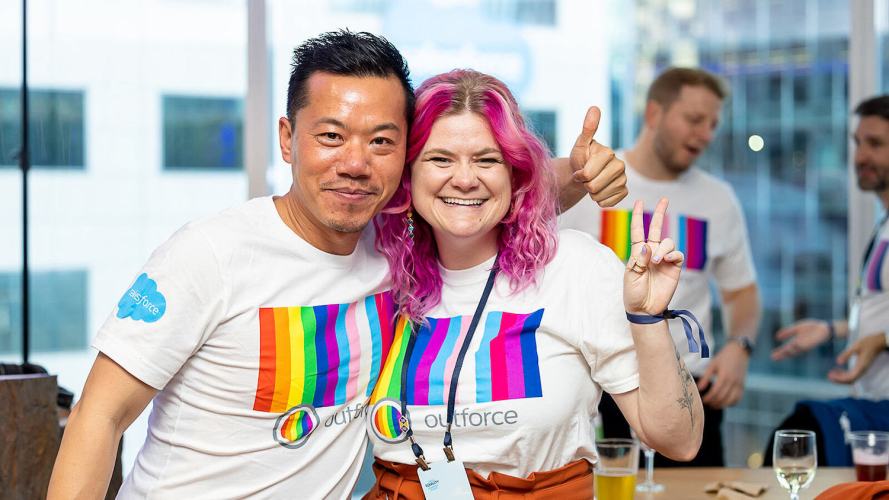3 Ways Generative AI Will Help Marketers Connect With Customers
3 min read



The LGBTQ+ community is under attack. In fact, the Human Rights Campaign (HRC) — America’s largest lesbian, gay, bisexual, transgender, and queer civil rights organization — has declared a national state of emergency for the community.
The American Civil Liberties Union is currently tracking nearly 500 anti-LGBTQ+ bills across the United States, with more than 75 bills passing into law this year. Of those introduced, over 200 target transgender and nonbinary people. The lives, livelihoods, and general wellbeing of trans folks, in particular, are being targeted by lawmakers more than ever.
The situation is urgent. Yet, the last few years have proven that businesses can be powerful platforms for change. That’s why it’s critical for companies to promote allyship in the workplace, and implement policies and practices that support LGBTQ+ communities. Pride Month might be nearly over, but companies can lead by example all year long.
Allyship is not about reaching a finish line or winning a medal — it’s an ongoing journey.



Active allyship — at all levels, from the individual to leadership — plays a crucial role in creating positive change. As the work toward equality continues, it’s important for corporations to show they’re committed to creating an environment where all people feel valued and respected.
And that means going beyond rainbow logos and parade sponsorships, which express support but can also seem performative. “What we’ve seen over the last 10 years is a lot of brands carrying the Pride flag for one month because they found it mutually beneficial,” said Jessica Romig, solution engineering manager at Salesforce. Romig was forced to leave her last company after she came out as trans. “Supporting Pride partly for business reasons is not a bad thing, but it is a bad thing in times of trouble — when companies reverse their position because now it’s more scary to be publicly supportive.”
Here are some ways companies can make a real difference for LGBTQ+ folks, during Pride and throughout the year.
In the U.S. alone, more than 8 million people in the workforce identify as LGBTQ+. Still, having non-LGBTQ+ colleagues support the rights of these communities is essential, particularly during such a hostile legislative climate. “Just because the government’s not bringing people together doesn’t mean that corporations can’t,” said Romig, who pursued a career at Salesforce due to its stance on equality.
According to McKinsey, 45% of LGBTQ+-identifying employees say they have to be careful about discussing their personal lives at work. This is harmful not only to them, but to the entire workforce, which thrives when diverse perspectives and backgrounds are welcome.
In 2021, Salesforce announced its gender-inclusive benefits, which include reimbursement for gender-affirmation medical procedures and treatments; gender-affirmation leave, wardrobe reimbursement; legal fee reimbursement; and counseling support. And the company’s Office of Equality empowers employees to become allies, offering trainings on subjects such as how to be a good colleague and ally to trans people.
For companies looking to support LGBTQ+ communities, Maslow’s Hierarchy of Needs can offer inspiration and guidance. “Most companies’ Pride participation seems to fall into the mid-pyramid areas of Love and Belonging and Esteem, which is great,” said Romig. Employee resource groups (ERGs) such as Outforce, Salesforce’s equality group for LGBTQ+ employees and allies, address these areas, as do resources like Warmline, which connects employees with advocates to help them navigate career and belonging concerns.
“Right now, though, we are facing existential problems on the bottom of the pyramid, particularly around Safety and Security,” Romig added. While ERGs do provide and promote psychological safety and create safe spaces for LGBTQ+ folks, companies can go further by implementing internal policies and benefits, and by supporting pro-LGBTQ+ legislation such as The Equality Act and the Respect for Marriage Act. Salesforce has partnered with HRC to oppose anti-LGBTQ+ legislation in the U.S., signed its Count Us In pledge, and joined GLAAD’s statement supporting the community as public allies.

3 min read

6 min read
The U.S. isn’t the only country presenting significant challenges to LGBTQ+ folks; these communities are facing oppression around the world. Brazil, for instance, has over 100 anti-LGBTQ+ bills being presented in government, and Italy’s government has halted, at the municipal level, the registration of same-sex couples’ children. In India, marriage equality is being decided on in the supreme court. A lot of work needs to be done to create a global society that’s not only safe for LGBTQ+ folks, but also truly embraces them.
“Japan is the only G7 nation with neither same-sex marriage nor legislation prohibiting discrimination on grounds of sexual orientation,” said Mei Yamaguchi, event marketing senior specialist at Salesforce and Outforce Japan leader. “There’s so much that corporations can do to change this situation, starting with showing up.” This year, Yamaguchi was among the 250 Salesforce employees and their family members who participated in the Tokyo Pride parade, the country’s largest parade to support LGBTQ+ individuals.
Pride Month serves as both a celebration and a protest: It’s a time to support LGBTQ+ folks by recognizing their achievements and resilience, while also raising awareness about the challenges they continue to face. By honoring Pride, corporations can show why allyship in the workplace is so essential, this month and every month: It’s about creating and supporting an environment — and a world — that’s safe and inclusive for all.

Get the latest articles in your inbox.


